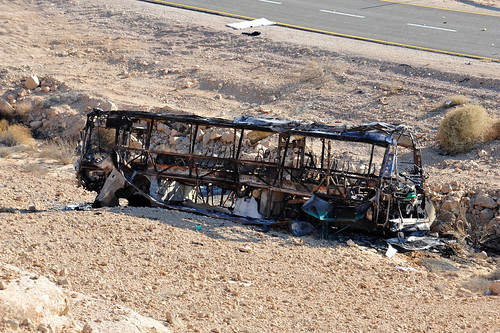Every hour, people in their cars, on the street, and at home stop what they are doing and listen intently to the radio. They're listening for news of the expanding conflict in Gaza, and for warnings of new terror attacks in Beer Sheva, Ashkelon, even Jerusalem. But mostly, they're listening for names, code words really, each individual waiting for the specific words that mean them, their unit.
 |
| Some rights reserved by Israel Defense Forces |
In the army as a kid you were in electronic communications, something fancy. But that's a regular army billet. As a reservist, you'll be assigned the type of duty that doesn't require year-around training. Maybe you'll dig a trench around a base, or stand guard by a gate. That wouldn't be too bad—relatively safe. Or maybe they'll decide that "electronic communications" means you are just the guy to carry a radio through the mean streets of Gaza while soldiers half your age go door-to-door to search for terrorists. Some of those doors explode, having been booby-trapped by an enemy who wants to kill you so badly that he doesn't care if he's also murdering his own civilians living in that house.
You tramp a ride on a southbound Jeep to meet up with your unit. Shit, you realize, I forgot to tell Rivka to deposit that check to cover the rent. There's too much to think about; there's nothing to think about. The Jeep never seems to miss a bump or pothole. Time goes slowly, but you're not in a hurry. You remember a song, a classic really, by Arik Einstein:
.ואני חושב עוד מעט זה עזה, ורק שלא יעוף איזה רימון, ונלך לעזאזל. סע לאט. סע לאט
And I think just a bit longer until Gaza... I just hope there's no grenade flying our way to send us all to hell. Go slow; go slow.
The driver is in his 30s, religious but not not the kind who get their kids exemptions from the army. He's got four at home, ages 2 to 10. He shrugs when you ask him how his wife is going to take care of the whole brood while he's on active duty: savta, he smiles. Grandma. Neither of you know any of the people killed in the recent terror attack, but then again, they were just like everybody you do know: the sisters headed down to Eilat for a relaxing weekend. The 22-year-old kid shot as he arrived at the scene to help rescue the survivors of the initial attack.
The world, which could not bring itself to denounce calculated attacks on women and children in Eilat, will certainly have something to say about your arrival at Gaza. Dozens of rockets rain down on the Negev—your nephew's high school gym took a direct hit, though it was, baruch Hashem, empty at the time. Mostly they fall into open fields, because nobody's aiming: if they hit a stalk of wheat or a room full of kindergartners, it's all the same to Hamas.
You suddenly comprehend a strange lyric from the same song, one you had never really understood before:
צבי אומר שגשמים כאלה מזיקים לחקלאותA land flowing with milk and honey. And steel rain. You wonder if you restocked the bomb shelter after the last time. You wonder if Rivka will remember the parent-teacher conference tomorrow.
Tzvi says that rain like this ruins the crops
Here's the base. Finally. You thank the driver, hop down from the Jeep, and glance up at the sky. Looks like rain.
How can you write an article so beautifully expressing the pain of being Jewish today and still insist that soldiers lose their lives by going from building to building to not kill civilians and to protect infrastructure? (These weren't alluded to here, but elsewhere, for those reading this.) We must kill them to the point where they are completely unable to reorganize regardless of how many so called civilians are killed or how much infrastructure is destroyed. Our children's future depend on what we do today! Also this is written by David Menter, brother of the Author. I didn't know how to change the "comment by" button.
ReplyDeleteWhat I'm writing about, actually, is the pain of being forced to defend your family and friends--civilians--from those who would indiscriminately kill them. I think we can see from your comment which side of that equation you're on--thanks for the clarification.
ReplyDeleteAnd thanks for the compliment, by the way.
ReplyDeleteThis was well written, as is all your stuff, but I have a problem with writing anecdotes about controversial subjects like this. People are susceptible to emotional appeals, and their stances on issues like the Israeli-Palestinian conflict shouldn't be based on stories like this, but on actual facts and logical analysis. Somebody could write an equally well-written story about a Palestinian in Gaza while Gaza was under fire from the Israeli army and it would make the IDF look like the bad guys. So while emotional appeals can be used to support almost any side of almost any conflict, only facts and logical analysis will point to the correct conclusion. This kind of writing contributes to an environment in which logic and facts don't matter, but emotional appeals do.
ReplyDelete